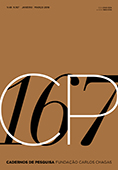Literature and education: notes on the role of literature in educational institutions
Keywords:
Literature, Formation, Reader, Teaching InstitutionsAbstract
This essay intends to discuss the formative role of literature at a time when its institutional presence is regulated by utilitarian discourses characteristic of a market culture. For this purpose, the argument is divided into two moments. Firstly, it discusses some of the setbacks literature suffered in the last century that weakened the discourses that hitherto justified its presence in educational institutions. Then, the essay indicates the need to revisit the categories of “work,”“reader” and “tradition” as a way of establishing a “formative” role for literature. If our time is characterized by the acceleration of objects, the notions of “work,” “reader” and “tradition” can operate as counterpoints capable of interrupting the continuous flow of things, dictating another temporality for literary studies.
Downloads
References
BARTHES, Roland. O rumor da língua. Traduçao de Mário Laranjeira. 2. ed. Sao Paulo: Martins Fontes, 2004.
BENJAMIN, Walter. Reflexões sobre a criança, o brinquedo e a educação. Traduçao de Marcus Vinicius Mazzari. Sao Paulo: Duas Cidades; 34, 2002.
BRASIL. Parâmetros curriculares nacionais (ensino médio). Parte II − Linguagens, códigos e suas tecnologias. Brasília: Ministério da Educaçao, Secretaria de Educaçao Básica, 2000.
BRASIL. Orientações curriculares para o ensino médio: v. 1. Linguagens, códigos e suas tecnologias. Brasília: Ministério da Educaçao, Secretaria de Educaçao Básica, 2006.
CHKLÓVSKI, Victor. A arte como procedimento. In: TODOROV, Tzvetan (Org.). Teoria da literatura: textos dos formalistas russos. Sao Paulo: Editora da Unesp, 2013. p. 83-108.
DURAO, Fabio Akcelrud. Sobre a relevância dos estudos literários hoje. Linguasagem, Sao Carlos, v. 2, p. 1-1, 2008. Disponível em: <http://www.letras.ufscar.br/linguasagem/edicao02/02e_fad.php>. Acesso em: 13 abr. 2017.
DURAO, Fabio Akcelrud. Do texto a obra. Alea, Rio de Janeiro, v. 13, n. 1, p. 67-81, jun. 2011a.
Disponível em: <http://www.scielo.br/scielo.php?script=sci_arttext&pid=S1517-106X2011000100005&lng=en&nrm=iso>. Acesso em: 15 maio 2017.
DURAO, Fabio Akcelrud. Teoria (literária) americana: uma introduçao crítica. Campinas: Autores Associados, 2011b.
DURAO, Fabio Akcelrud. Fragmentos reunidos. Sao Paulo: Nankin, 2015.
DURAO, Fabio Akcelrud. O que aconteceu com a teoria? In: CECHINEL, André. (Org.). O lugar da teoria literária. Florianópolis: EdUFSC; Criciúma: Ediunesc, 2016. p. 13-27.
EAGLETON, Terry. Teoria da literatura: uma introduçao. Traduçao de Waltensir Dutra. 6. ed. Sao Paulo: Martins Fontes, 2006.
GOETHE, Johan Wolfgang von. Os anos de aprendizado de Wilhelm Meister. Traduçao de Nicolino Simone Neto. Sao Paulo: 34, 2006.
JAKOBSON, Roman. O dominante. In: LIMA, Luiz Costa (Org.). Teoria da literatura em suas fontes. 3. ed. Rio de Janeiro: Civilizaçao Brasileira, 2002. v. 1, p. 511-518.
LAVAL, Christian. A escola não é uma empresa: o neo-liberalismo em ataque ao ensino público. Traduçao de Maria Luiza M. de Carvalho e Silva. Londrina: Planta, 2004.
PERRONE-MOISÉS, Leyla. Inútil poesia. Sao Paulo: Companhia das Letras, 2000.
PERRONE-MOISÉS, Leyla. Mutações da literatura no século XXI. Sao Paulo: Companhia das Letras, 2016.
TODOROV, Tzvetan. A literatura em perigo. Traduçao de Caio Meira. 2. ed. Rio de Janeiro: Difel, 2009.
Downloads
Published
How to Cite
Issue
Section
License
Copyright (c) 2018 Cadernos de Pesquisa

This work is licensed under a Creative Commons Attribution-NonCommercial 4.0 International License.
Authors who publish in this journal agree to the following terms:
a. Authors retain the copyright and grant the journal the right to first publication, with the paper simultaneously licensed under the Creative Commons Attribution license that allows the sharing of the paper with acknowledgment of authorship and initial publication in this journal.
b. Authors are authorized to assume additional contracts separately, for non-exclusive distribution of the version of the paper published in this journal (for example publishing in institutional repository or as a book chapter), with acknowledgment of authorship and initial publication in this journal.
c. Authors are allowed and encouraged to publish and distribute their paper on-line (for example in institutional repositories or on their personal page) at any moment before or during the editorial process, as this can generate productive changes, as well as increase the impact and citation of the published paper (See The Effect of Open Access).









